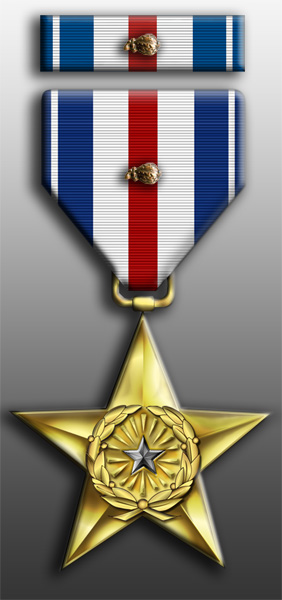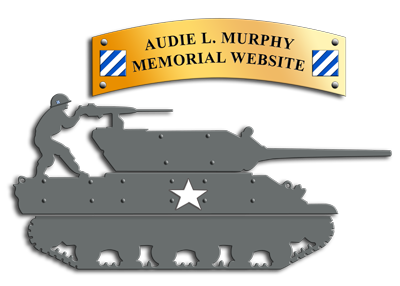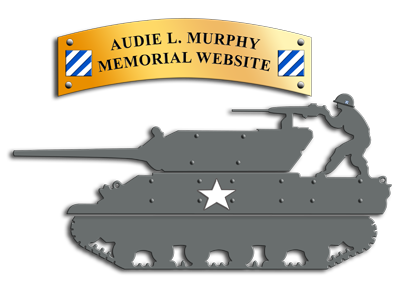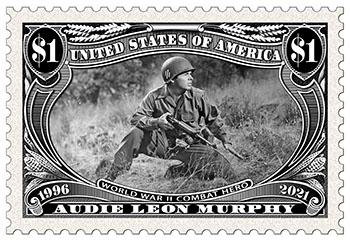
|
| Silver Star With Oak Leaf Cluster
|
The first Silver Star was earned by Audie Murphy as a Staff Sergeant for heroic actions taken on October 2, 1944 on a rugged, wooded hill covered with large boulders and brush. The hill's summit could only be approached from its steep sides.
Near the top was an excavated area known as the Cleurie Quarry which had a large number of passageways carved into it. This network of tunnels afforded excellent protection and allowed its defenders to move rapidly from position to position while under heavy fire. From this position German snipers and hidden machine gun nests were stubbornly harassing friendly forces with deadly results.
On that day, the batallion commander of 1st Battalion, 15th Infantry Regiment, Lieutenant Colonel Michael Paulick and his executive officer, Lieutenant Colonel Keith L. Ware, the B Company commander, Captain Paul Harris, and 4 enlisted men decided to visit the front lines. The officers were trying to identify the source of harassing machine gun fire which was hindering the forward movement of the battalion and inflicting serious casualties.
Staff Sergeant Murphy who was not part of the group did not like the plan and warned them there would likely be trouble. He knew that snipers and hidden machine gun nests would probably be encountered. Disregarding Murphy's advice, the group began its ascent up the hill. Murphy decided to secretly trail them by about 25 yards and to their flank should trouble occur.
At some point, a hidden German machine gun spotted the group as it passed. From a distance of thirty or forty yards, it suddenly began firing on the Americans who managed to take cover in a shallow depression. Unfortunately, they were hopelessly pinned and were likely to soon be subjected to grenades.
Staff Sergeant Murphy was not far from the machine gun nest when it began to fire. From behind a large boulder, Murphy immediately called the names of each officer. Murphy's intent was to alert them that rescue was in progress, to remain under cover, and not to panic.
Murphy then moved from behind the boulder with his carbine in one hand and a grenade in the other. As he did, the German machine gun crew spotted him from a distance of about 15 yards away. As the crew pivoted its gun and fired, the barrel was deflected when it snagged on some brush. The machine gun sprayed rounds that barely missed Murphy. Murphy took advantage of the mishap by tossing a grenade then firing his weapon. Before the grenade detonated, two Germans were dead from shots to their stomachs.
Murphy tossed two more grenades which effectively destroyed the position. Of 8 German solders, 4 were dead, three were wounded, and an eigth fled with his weapon. Murphy quickly spotted and killed him too.
Staff Sergeant Murphy's second Silver Star was earned three days later on the afternoon of October 5, 1944.
On this day, Murphy led his twenty-seven man platoon, the advance element of his company, over a hill and down its other side along a dry creek bed. They were several miles north of Cleurie.
Murphy used the creek bed knowing that German defensive tactics commonly employed well dug in positions from high points with commanding fields of fire. But the Germans changed their tactics on this day by hiding in excellently concealed positions near the hill's base along the creek using fallen trees for cover.
As the Germans opened up with sniper and machine gun fire on Murphy's men, six or seven soldiers were quickly killed or hit before the platoon could find a safe position. The other platoons in the company remained under cover on the other side of the hill probably waiting for an assessment of the situation from Murphy before they attempted to formulate any plans of their own.
Murphy had no idea where the enemy was at. Slowly moving forward down the hill with six men and a walkie-talkie, Murphy and his men did their best to use the sparse cover available. Unfortunately, a machine gun opened up and killed or wounded four more men in the patrol before it was halfway down the hill.
Murphy ordered his remaining men to dig in while lying on their backs. As they raked shallow depressions out of the rocky soil with their entrenching tools, bullets continued to be fired just above their heads.
Cold, wet, and scared, Murphy decided to move forward alone to try and pinpoint the enemy. Taking advantage of every slight depression and any available concealment he could find, he crawled forward as close to the ground as he could possibly get.
Murphy's luck held as he managed to move down and forward another fifty yards to a safe depression. He then noticed two German snipers in foxholes which were dug in forward of the main enemy location about 200 yards away.
Murphy shot and killed the snipers from his position. Using his walkie-talkie, he then called for indirect fire support and adjusted 4.2 millimeter mortar rounds onto the enemy position. As Murphy accurately gave instructions on where to place the rounds, Germans who decided to take cover from the deadly mortar barrage quickly became casualties. Those that opted to flee were soon picked off by the American soldiers watching from the hillside.
For nearly an hour, Murphy directed the mortars from his position. When the battle was over fifteen enemy soldiers were dead with another thirty-five wounded (Simpson, pages 131-135).
| 






